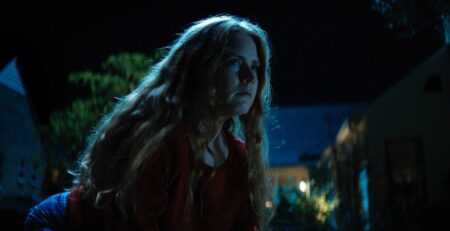Nuovo Olimpo is a Netflix Original Italian-language romance by one of Italy’s renowned directors of queer cinema Ferzan Özpetek and his longtime writing partner Gianni Romoli. A film student Enea (Damiano Gavino) and a medical student Pietro (Andrea Di Luigi) have a chance encounter that leads them to fall in love. Only, as fate would have it, they become separated for decades. Their lives carry on, but neither ever forgets about the other.
For all of the credit that Özpetek completely deserves for bringing gay life and love to the screen over the decades, this one just doesn’t hit. Nuovo Olimpo is a classic tale of right-person-wrong-time. Enea and Pietro meet when they’re young and idealistic. Enea is a regular at a cinema known as a spot for gay men to meet and hook up. Pietro happens upon the Nuovo Olimpo after first running into Enea on the set of a film he’s shooting. They’re both instantly infatuated but Pietro has never been with a man before, so he’s understandably nervous.
The initial several rendezvous are sweet, especially as Enea gives Pietro plenty of room to feel how he feels and ease into a relationship physically and emotionally. The house they make use of to get away from the prying eyes of the theatergoers and Enea’s other friends is quite pretty, and the theater set itself is a nice bit of nostalgia for a time when repertory theaters were everywhere. But the charm just about ends there.
Once the two main characters are forced apart, they spend most of the rest of the movie in two entirely separate universes with new, dull partners and lackluster adult lives over a few decades. None of what happens is offensive. It’s just uninteresting. Enea’s partner gets a lot of screen time, but he comes off so poorly at first that it’s hard to feel bad for him when he’s supposed to be a sympathetic character later on. He’s rude and demanding—it’s completely offputting right away.

Pietro’s partner on the other hand could have been completely missed were it not for the one strong slice of 90 seconds she gets at the end. There’s nothing to her character otherwise. Which, to be fair, is part of the point, from Pietro’s perspective, so she fulfills her role as a character. But because nearly the whole movie is set with the two main romantic interests not even knowing each other exist, let alone in the same room, the movie needs its other relationships to be interesting to carry it through. It does not.
If anything comes close to redeeming Nuovo Olimpo, it’s the ending. It doesn’t redeem it completely, but it does tie up the movie’s moral nicely. It’s the ending you might expect, and it’s the ending the story completely deserves, but it’s not necessarily the ending that a typical romance provides. Whether one can hold room in their life for a former lover is a valiant question, and the movie seems to have a strong answer to it. It would have perhaps been more interesting if the movie was more curious about the quandary than it was steadfast in its opinion, but at least it makes a decision and sticks to it well.
The scene that runs over the initial credits, however, feels like it completely runs against that assuredness. Sticking so hard to a specific point of view only to ask a “what if?” stinger doesn’t even feel saccharine, it just feels sacrilegious and indulgent. Alas, it might still make you say “aw” for a second before turning it off.
Nuovo Olimpo is, unfortunately, not enough to make its delightful concept work. Keeping the love interests apart the whole movie is necessary to fulfill its plot and its moral, but it leaves the entire middle of the movie bare. Plus, the hair and makeup on the older Enea and Pietro are so jarring that it distracts from all of the final act’s sincerity. It’s nice to have a gay romance with a deep question at its heart, but it would be nicer to have an interesting movie.
Nuovo Olimpo is streaming now on Netflix.
Nuovo Olimpo
-
Rating - 5.5/105.5/10
TL;DR
Nuovo Olimpo is, unfortunately, not enough to make its delightful concept work. Keeping the love interests apart the whole movie is necessary to fulfill its plot and its moral, but it leaves the entire middle of the movie bare.





